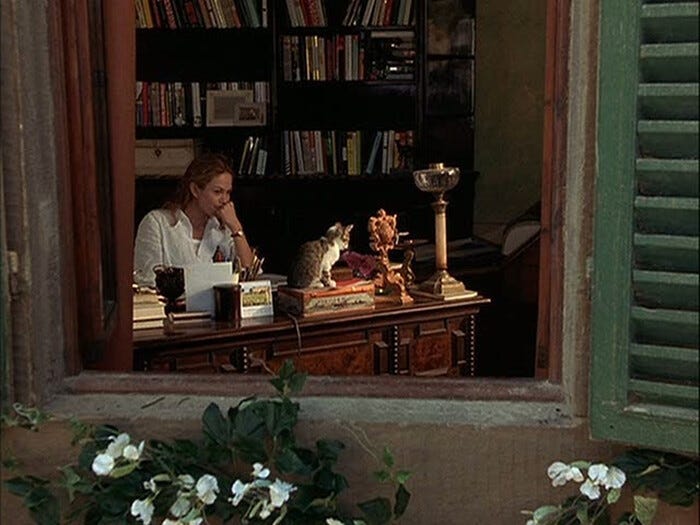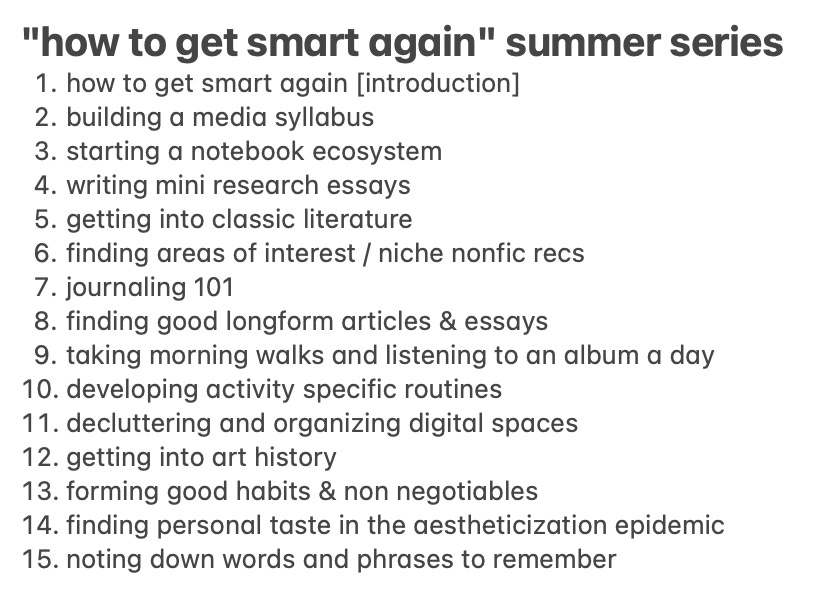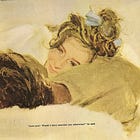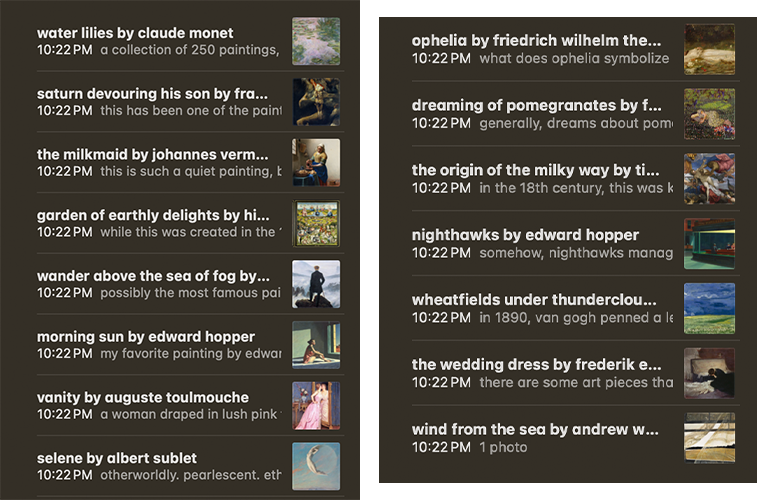how to get smart again: writing mini research essays
a case for digging rabbit holes, researching, and writing essays for fun. and some topics to get you started
[this is part 4 of my summer series for paid subscribers—check out the upcoming posts here. thank you so much for your support! decided i have a lot more to write about so i am extending it!]
I dig rabbit holes. Usually this consists of me finding a Wikipedia list page that leads to hundreds of links, such as the last survivors of a historical event, literary movements, and delving into one specific case that interests me the most. Sometimes the rabbit hole will be influenced by an article I read or a line in a book and I’ll spend a few hours looking into the subject at hand.
My “how to get smart again” series revolves around my feeling and fear of that my brain has been regressing and melting—a sentiment echoed by at least 32,000 of you, which truly proves that this is perhaps a societal malaise in a way. But it also revolves around the optimistic (rare for me, yes) sentiment and proven fact that this problem is easily curable because our brains are highly adaptable and malleable. Your brain, no matter how much you don’t use it, will never be ‘permanently ruined’. Just like how we begin exercising when we begin to feel unfit, the same goes for our brains. All we need to do is focus on feeding our brains good food.
This series has been an array of posts about how I’ve been adhering to certain rules to allow my brain space to breathe and grow amid the global pandemic of using artificial intelligence (namely, ChatGPT) for everything. I also think that ironically, information is too accessible and thus oversaturated, and finding good pieces amid the billion search results has become increasingly more difficult. Ironically, in this light, accessibility to a good education has decreased. And personally, I think this over-accessibility has made me lazy with regards to my own intellectual curiosity and wish to learn, as I keep thinking that this sort of information will always be accessible, propagating a sort of procrastination on a way.
Academia, true academia, increasingly feels like a sector that is pushed more and more towards irrelevance in this age of, to put it bluntly, anti-intellectualism. Reading is being pushed as an alternate form of a mindlessly binge-able television show (and I’m not saying that reading should not be enjoyable, but reading should not really be a mindless activity either), and logic or reason is being overwhelmed by a stubborn refusal to educate oneself with facts. Even any sort of media with depth is often brushed off as “too deep” or god forbid, “too pretentious” (which
has a brilliant essay about that you should check out as a preface), when the common misuse of that word actually signifies the proof of anti-intellectualism.Anyway, I’m digressing and rambling too much. The purpose of this post: making a case for writing mini essays for anyone who makes looking up random interesting Wikipedia pages, or enjoys reading the articles in the footnotes of an article. Or anyone who enjoys learning, in general. I wanted to create something for myself that allows me to keep record of the things I am interested in and the things I research for fun, in some sort of cohesive form. Hastily scrawling notes down in my research notebook is usually the first thing I do because I just really enjoy handwriting things. Making mini essays out of these 1) improves my writing and analytical skills, 2) allows me to archive a somewhat completed form of research, and 3) forces me to really slow down and digest the information given to me, which in turn betters my ability to discern what is good information from bad.
Below you will find:
what I define as a mini essay and its importance
how I structure these essays
how to get started & find what you are interested in
some niche research topics to get you started
what is a mini essay? and why should you start writing them?
A mini essay is basically a short, low-commitment, imperfect essay. I think we have been aversely conditioned to interpret the word ‘essay’ as a sort of herculean task—we toil away for dozens of hours, only to be met with harsh feedback from an instructor. And most of all, we oftentimes define writing essays as something we are forced to do. Away from the institutional academia of it all, however, writing essays is a great way to exercise and measure the breadth and depth of your knowledge.
By writing mini essays, you are doing an array of beneficial things for your brain: you are organizing what you learned in your head while figuring out what information is important enough to record. Additionally, I always say that writing is a muscle, and you won’t be good at it unless you feed yourself (reading) and exercise (actually writing).
In terms of why I stared writing mini essays, I was greatly inspired by Joan Didion’s essay on keeping a notebook in her collection, Slouching Towards Bethlehem. This is one of the essays that changed my life. In it, Didion writes about the purpose of keeping a notebook and how it is different from keeping a diary—a notebook should be for recording external observations such as various overheard conversations or random facts that you pick up throughout the day. A notebook should ideally feel like written notes about other people and your surroundings, but in reality, it should be about an evolution of how you perceive the world around you.
I wanted to do this with the information that I learn, as I think so many interesting and meaningful new things just brush past me and it becomes lost in the abyss of everything else I will never remember again. I think I have a mild fear of wondering what if I don’t remember something important because I forget to write it down? Or because I don’t look it up?
the structure:
There’s no template or rigid structure I use for my mini essays, but I make sure it is cohesive enough for it to be understood by someone who has no knowledge on said topic. I always imagine trying to explain whatever I learned to my little sister—this way, I can check if I understand it as well (the simpler you can break down information, the further proof it is that you truly understand something).
I do have a few things I always make sure to include: some sort of loose definition in two sentences at the start, background, personal analysis, and a few sentences on further implications if applicable. I also like to write tangents on related topics or concepts that I think are inextricable with what I am writing (and if I find the related topic interesting enough, I’ll write a linked essay). The definition usually ends up looking something like a very rudimentary thesis statement.
For example, if I am writing about a painting, I’ll research about the artist, maybe read a few biographical essays on him, and also look into the specific movement the painting belongs in. I think it’s important to know the background and history from where a certain piece of media is derived from. Below is an essay I wrote two months ago where I loosely pieced together two smaller essays I wrote (one on Klimt’s The Kiss and one on Magritte’s The Lovers). You can see the basic bones of the essays themselves, from its history to a few elements of the painting I paid attention to by analyzing.
I usually don’t write anything personal in the mini essays because I think that negates the whole purpose of keeping a research notebook or writing mini essays. These should just pertain to the research and your findings. They sometimes end up looking like a literature review when whatever I’m researching is more of a general idea or concept, and I like that too. (I also just sometimes find writing about myself or incorporating personal experiences into every essay I write a bit self aggrandizing). Obviously, in my post above, I wrote about a lot of personal anecdotes, but that would usually go into my journal separately.
Speaking of literature reviews, I like putting in little interludes in my mini essays with summarizing interesting journals or articles I find on the topic. Usually I will look on Google Scholar or even Wikipedia footnotes. If you are a college student, look on JSTOR! This is probably the thing I miss the most about being a college student—and like most things, I didn’t even know I missed it until it was gone.





